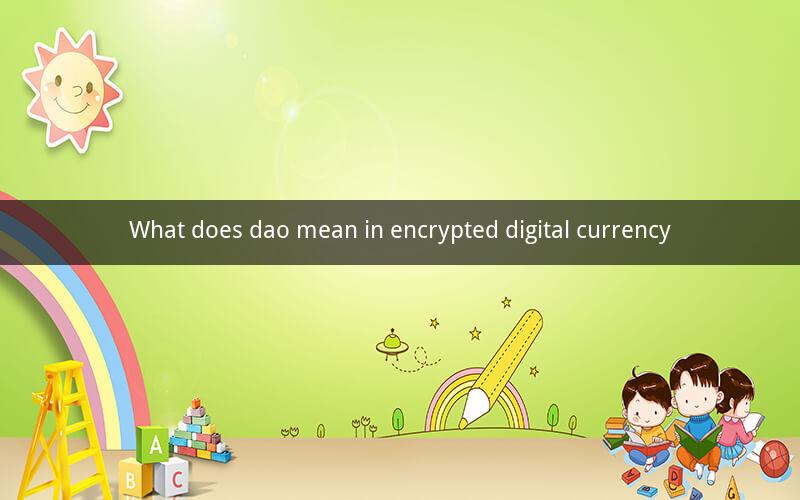
Table of Contents
1. Introduction to DAO
2. The Concept of DAO in Digital Currency
3. How DAOs Work
4. The Role of Blockchain Technology in DAOs
5. Benefits of DAOs in the Cryptocurrency Space
6. Challenges and Limitations of DAOs
7. Examples of DAOs in the Cryptocurrency Industry
8. The Future of DAOs
9. Conclusion
1. Introduction to DAO
The term "DAO" stands for Decentralized Autonomous Organization. It is a concept that has gained significant attention in the world of digital currency and blockchain technology. DAOs are designed to operate without traditional hierarchical structures, relying on smart contracts to govern and manage the organization.
2. The Concept of DAO in Digital Currency
In the context of digital currency, a DAO is an organization that operates on a decentralized network, typically a blockchain. Unlike traditional organizations, DAOs do not have a central authority or management structure. Instead, they are governed by a set of rules encoded in smart contracts, which are self-executing contracts with the terms of the agreement directly written into lines of code.
3. How DAOs Work
DAOs function by pooling together digital assets, such as cryptocurrencies, and using them to achieve a common goal. Members of the DAO contribute to this pool by purchasing or earning tokens, which represent their share in the organization. Decisions about the DAO's operations and direction are made through a voting system, where the number of tokens a member holds determines their voting power.
4. The Role of Blockchain Technology in DAOs
Blockchain technology is fundamental to the operation of DAOs. It provides a secure, transparent, and immutable ledger that records all transactions and interactions within the organization. This ensures that the governance process is fair and transparent, as all members can verify the decisions made by the DAO.
5. Benefits of DAOs in the Cryptocurrency Space
There are several benefits to using DAOs in the cryptocurrency space:
- Decentralization: DAOs eliminate the need for a central authority, making them more resistant to manipulation and corruption.
- Transparency: All transactions and decisions are recorded on the blockchain, ensuring transparency and accountability.
- Community-driven: DAOs empower their members by allowing them to participate in the decision-making process, fostering a sense of ownership and commitment.
- Efficiency: The use of smart contracts automates many processes, reducing the need for intermediaries and speeding up operations.
6. Challenges and Limitations of DAOs
Despite their advantages, DAOs also face several challenges and limitations:
- Complexity: Understanding and navigating the intricacies of blockchain technology and smart contracts can be complex for non-technical members.
- Security Risks: Smart contracts are only as secure as their code. A single vulnerability can be exploited, leading to significant financial losses.
- Legal and Regulatory Uncertainty: The legal status of DAOs varies by jurisdiction, and there is often uncertainty about how they will be regulated.
7. Examples of DAOs in the Cryptocurrency Industry
Several prominent DAOs have emerged in the cryptocurrency industry, including:
- The DAO: One of the first and most notable DAOs, which aimed to create a decentralized venture capital fund.
- MakerDAO: A decentralized platform for creating and managing Dai, a stablecoin that is designed to minimize volatility.
- Arbitrum: A DAO that supports the Ethereum network by providing a layer 2 scaling solution.
8. The Future of DAOs
The future of DAOs in the cryptocurrency space looks promising. As blockchain technology continues to evolve and become more accessible, we can expect to see more innovative DAOs emerge. These organizations have the potential to revolutionize how we govern and manage digital assets, creating a more transparent and efficient ecosystem.
9. Conclusion
DAOs represent a significant shift in how organizations operate, especially in the cryptocurrency space. By leveraging blockchain technology and smart contracts, DAOs offer a new model of governance that is decentralized, transparent, and community-driven. While challenges and limitations exist, the potential benefits of DAOs make them a compelling concept for the future of digital currency.
---
Questions and Answers
1. Q: What is the primary purpose of a DAO?
A: The primary purpose of a DAO is to manage a shared digital asset, such as a cryptocurrency, while maintaining a decentralized and autonomous governance structure.
2. Q: How do DAOs ensure transparency?
A: DAOs ensure transparency by recording all transactions and decisions on the blockchain, which is accessible to all members.
3. Q: Can anyone join a DAO?
A: Yes, anyone can join a DAO by purchasing or earning tokens that represent their share in the organization.
4. Q: What is the role of smart contracts in a DAO?
A: Smart contracts in a DAO serve as the governing agreements, automatically executing decisions and transactions based on predefined rules.
5. Q: How are decisions made in a DAO?
A: Decisions in a DAO are typically made through a voting system, where the number of tokens a member holds determines their voting power.
6. Q: What are the risks associated with participating in a DAO?
A: Risks include security vulnerabilities in smart contracts, legal and regulatory uncertainty, and the complexity of the technology.
7. Q: Can DAOs operate without blockchain technology?
A: No, DAOs rely on blockchain technology to provide the decentralized, secure, and transparent environment necessary for their operations.
8. Q: How do DAOs compare to traditional corporations?
A: DAOs differ from traditional corporations by eliminating central authority, relying on smart contracts for governance, and being community-driven.
9. Q: Are DAOs limited to the cryptocurrency space?
A: While DAOs are currently most prevalent in the cryptocurrency space, their principles could be applied to other areas, such as real estate or the arts.
10. Q: What is the potential impact of DAOs on society?
A: The potential impact of DAOs on society is significant, as they could lead to more transparent and efficient governance structures, fostering greater community engagement and participation.